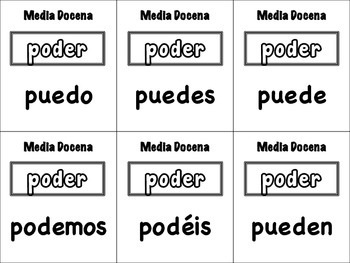
For example, to say “I get myself up” you would say me levanto. This piece is called a reflexive pronoun and also must match with the subject. Basically, these verbs are conjugated normally then have an additional piece tied to them. Any verb that has “ se” after it is a reflexive verb, like levantarse and dormirse.

Reflexive Spanish VerbsĪ reflexive verb describes an action that is done to oneself. If you treat these unknowns as regular verbs, people will still likely understand you and can even teach you. If you aren’t sure if a verb is regular or irregular, don’t sweat it. Not many verbs act as oddly as this one, but they are out there! Many common verbs like ser are irregular and can be picked up easily with some practice. Ser – to be, is a great example of this.Īs you can see, this one is totally weird. Other verbs are totally irregular and don’t follow a pattern. Querer – to want, is an E→ IE verb because it becomes qu ie r- + verb ending. For example, some verbs are called stem changers because the middle part of the verb changes. Īll verbs use these predetermined endings, however, some verbs are irregular and have an extra step. Here are the steps in action using the pronoun “she” – ella. Here are the steps in action using the pronoun “I” – yo. Here are the steps in action using the pronoun “we” – nosotros. Here are all of the verb endings along with examples. In summary, take off the verb’s last two letters then stick on the appropriate ending to make it match the pronoun. Attach the ending that matches the tense, pronoun, and verb type.Take off the ending, either – ar, -er, or -ir.Do you want to say that he speaks, we speak etc. To learn the basic steps to verb conjugation, we will be looking at the present tense.
#Dirty dozen spanish verb endings plus
Each box in that pronoun table from earlier has its own unique verb ending, plus each verb type has its own set of endings. Once you know the Spanish pronouns, the second thing to learn is the verb endings. What Are The Basic Steps to Conjugate Spanish Verbs? These verbs are currently in the infinitive form, which is a fancy way of saying that it is the “pure” version of the verb that hasn’t been changed to match a pronoun or verb tense. To exemplify each verb type, we will be using hablar – to talk, comer – to eat, and vivir – to live. These are the three verb types that you will encounter and will determine how the verb is conjugated. In the Spanish language, all verbs end in -ar, -er, or -ir. Now, let’s learn some verbs! Spanish Verb Types And The Infinitive 🚩Note that in Spanish, “ it” is not really a pronoun so “he” or “she” is used. Ustedes – You all (formal, latin american) Vosotros – You all (men, mixed men and women) The pronouns that share a square have the same conjugation, much like how in English “he, she, it” are in the same box.

In order to use verbs, you’ll have to know Spanish pronouns.

English tends to rely on pronouns for this, whereas Spanish changes the verb itself therefore making the pronoun optional.įor example, here is the verb “to talk” conjugated in the present tense in English: I talk
#Dirty dozen spanish verb endings how to


 0 kommentar(er)
0 kommentar(er)
